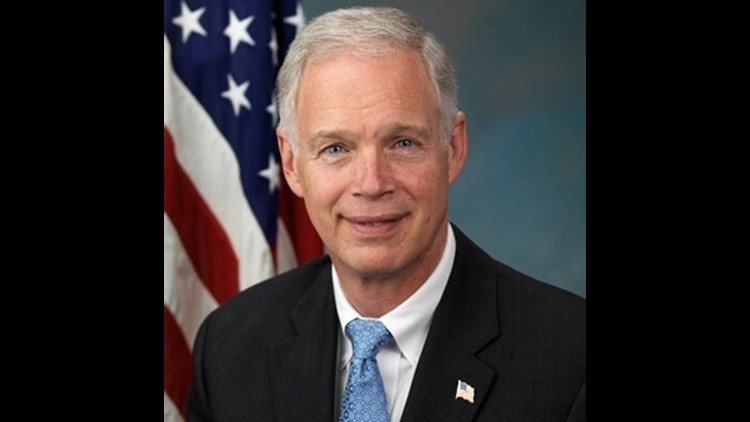(CNN) — In the US Senate, the tax bill could fail or succeed based off of the votes of just a handful of members. After recess this week, Senators will return from Thanksgiving and move immediately to vote on a plan that would permanently lower the corporate tax rate, temporarily lower rates across the middle-class and would drastically reshape the country’s tax code.
But, the math is tough. Majority Leader Mitch McConnell is moving forward with a Senate process that only allows him to lose two members and still pass his bill. Already one member has announced he’s opposed and another is leaning against the bill. That means that in the next two weeks, McConnell has to hold his conference together or be faced with yet another failure on one of the GOP’s top campaign promises.
Here are the players to watch.
Sen. Ron Johnson
The Wisconsin Senator made major news last week when he became the first member of the Republican Party to come out against the Senate’s tax bill. Johnson’s problem with the legislation boils down to his concern about the way the Senate bill treats pass-through entities versus how it treats corporations. Under the bill, Johnson has argued that small businesses — many of whom use the pass-through structure to pay taxes– aren’t getting a fair deal.
“I’m just looking for a fair shake for all businesses to maintain the competitive balance and position of all businesses,” Johnson told CNN, later adding: “I’m not for the current version.”
Businesses who use the pass-through structure to pay taxes range from small businesses to larger companies, but the term means that business profit is passed onto the owner of the company or the shareholders who then pay taxes as personal income.
Johnson has said he could get to “yes,” but without Johnson’s vote, McConnell can only lose one more Republican member and still pass his tax bill.
Sen. Jeff Flake
When the Arizona Republican announced last month that he wouldn’t be running for re-election, he solidified his wild card status for the remainder of his term. Flake has long been known for his opposition to President Donald Trump, and though Flake has supported a number of key Republican votes this year, he has still been harshly critical of the White House and refuses to tow the party line when it comes to messaging — making him unpredictable at times.
Trump blasted Flake Sunday night on Twitter after the Arizona senator was caught criticizing Trump and Alabama Senate hopeful Roy Moore. Trump asserted that Flake was a “no” on tax reform, even though Flake hasn’t definitively said how he’ll vote on the bill. Flake reiterated his concerns Monday in a radio interview with KFYI that tax reform could explode the debt. “So I’m going to balance this reform package with that in mind,” he said.
Flake said that “what the President does or says or feels has nothing to do whatsoever with how” he will vote on the tax bill.
Sen. Susan Collins
Collins has repeatedly cited her concerns about the tax bill in the past week. On CNN’s “State of the Union,” the Republican from Maine reiterated Sunday her disapproval of the decision to include a repeal of the individual heath insurance mandate as a way to raise revenues.
“I don’t think that provision should be in the bill. I hope the Senate will follow the lead of the House and strike it,” she said, arguing that the move would increase premiums and offset any tax relief for middle income families.
Collins has established herself as an independent Republican who’s not a guaranteed “yes” for her party on major bills. She opposed multiple attempts by Republicans this summer to repeal the Affordable Care Act, for example.
Sen. Lisa Murkowski
When Republicans added the individual mandate repeal, all eyes also turned to Murkowski, who joined with Collins and Sen. John McCain to oppose similar legislation earlier this summer. Republicans, however, are optimistic that Murkowski will still sign onto the tax reform bill, even if it includes the health care provision.
That’s because the tax bill, due to arcane Senate rules, will be combined with a bill that recently passed out of the Senate Energy and Natural Resources Committee. Murkowski, who chairs the committee, has long tried to pass this bill, which approves drilling in Alaska’s Arctic National Wildlife Refuge.
Murkowski said Thursday that she worries about bringing the individual mandate into the tax reform debate. “Both pieces of those are complicated and together they become more complicated,” she said.
But Murkowski realizes that if she votes against the tax bill, she’d be voting against opening up ANWR — “which would not be something that I would want.”
Sen. John McCain
So far McCain has not signaled any alarms that he might vote against the bill. While McCain has upheld his maverick status this year — teaming up with Collins and Murkowski to defeat the mandate repeal, for example — he hasn’t expressed any major concerns about the tax reform bill.
In a statement Friday, he applauded the Senate Finance Committee for passing the bill through “regular order,” meaning it spent four days in markup and considered amendments. That was not the case with the health care bill effort this summer and it was a big reason why McCain voted against it in the end.
Still, McCain has made it clear that he wants to see the entire bill, including any changes to it that might happen on the Senate floor, before he states his position. So Republicans still consider him a wild card until they have a better idea of what exactly McCain wants to see in the bill.
Sen. Bob Corker
The Tennessee Republican has said all along he will not support a bill that adds one penny to the deficit, but Corker hasn’t come out as a definitive “yes” or “no” on the tax bill just yet.
Part of the reasons is that Corker is concerned about how the Senate tax bill is structured. In the bill, many of the individual tax breaks that help the middle-class would expire in 2025.
That’s done in order to ensure the bill doesn’t add to the deficit outside the 10-year window, which is not allowed under Senate rules if Republicans want to pass it with a simple majority. But it’s more of a budget gimmick. Republicans have said that when the time comes, they won’t really let the cuts expire, but that has created cause for concern for lawmakers like Corker who has made fiscally responsible tax cuts a condition of his vote.
“I met with Mnuchin today. I continue to talk to the tax writers. I haven’t spoken to a single piece of policy on it. It’s just a broader picture of, you know, I just want to make sure this is something that is going to strengthen our country over time,” Corker told CNN last week. “But I haven’t taken a position on the bill yet. I’m still working with folks to see if there is some way to be ensured that, as it relates to the deficit issue, we’re not going to create harm.”
Sen. Rand Paul
Few lawmakers are the kind of wild card that Sen. Rand Paul, whom leadership is keeping a close eye on but isn’t sure they will be able to convince, is. After suffering severe injuries after a neighbor allegedly attacked him, Paul has not been as visible on Capitol Hill as he’s been in debates past, but he remains a key vote.
Here’s what we know: Paul had been one of the members who demanded that the repeal of the individual mandate be included in the tax bill. That provision was added last week. But, that doesn’t mean we can automatically assume Paul will be a”yes.”
When asked whether the Kentucky Republican supports the bill, an aide to Paul told CNN on Monday, “He will likely support.”



